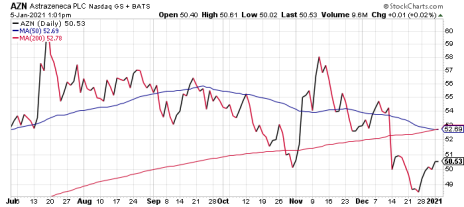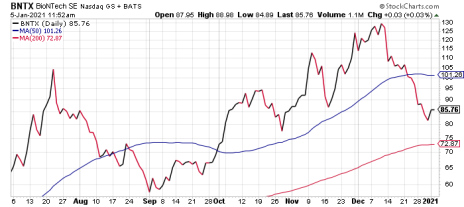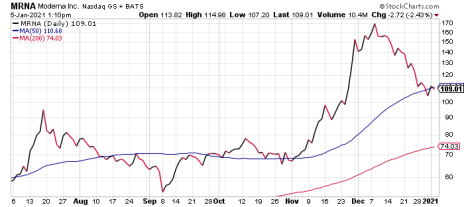It’s been three weeks since people started receiving the first dose of COVID-19 vaccines. With the pandemic worsening across the globe, how much longer this nightmare persists will depend entirely on how quickly the different vaccine variants can be distributed to the masses. And the escalating arms race should continue to be a boon for vaccine stocks.
But which vaccine stock should you place your bets on?
Right now, there are four primary candidates: Pfizer (PFE), BioNTech (BNTX), Moderna (MRNA) and the latest addition to the fray, AstraZeneca (AZN). Because Pfizer is such a known quantity and large company ($204 billion market cap), and since its vaccine is in collaboration with upstart German biotech BioNTech, let’s remove PFE from the equation. That leaves three vaccine stock candidates for investment: BNTX, MRNA and AZN.
[text_ad use_post='129627']
Let’s examine (in alphabetical order) each of those three companies, their vaccine distribution plans, and their stocks.
Vaccine Stock #1: AstraZeneca (AZN)
Market Cap: $132 billion
One-Year Return: Flat
AstraZeneca is the latest company to join the global vaccine rush, as the British-Swedish multinational biotech joined forces with the University of Oxford to produce a COVID-19 vaccine that just started being administered this Monday, in the U.K.
Despite being later to the party than Moderna and the Pfizer-BioNTech collaborations, AstraZeneca has a couple distinct advantages over both: it costs just $3 or $4 per dose, making it affordable for countries around the world, not just the wealthiest nations, and it doesn’t have to be stored in specialty freezers at -94 degrees Fahrenheit, requiring only standard refrigeration, making it easier to transport.
The downside? First, that price tag: AstraZeneca has benevolently vowed not to turn a profit on its vaccine during the pandemic, in a noble effort to make it the more affordable – and thus more widely distributed – COVID-19 shot. Also, it is not yet as effective as Pfizer or Moderna’s vaccine, with Stage 3 trials proving only 70% successful at preventing coronavirus symptoms, versus the 95% success rate of the other two.
As for the stock, it’s been totally flat in the last year, and thus trades at a mere 20 times forward earnings with 20% EPS growth expected this year. That might seem appealing from a value investing perspective (it also has something for income investors, paying a 2.8% dividend yield). But AZN has no momentum and hasn’t even budged in the last couple days, with Wall Street collectively shrugging its shoulders at its vaccine rollout.
So while AstraZeneca’s shot may be the most important one yet in terms of taming the pandemic in all corners of the globe, it doesn’t make for a very appealing investment.
Vaccine Stock #2: BioNTech (BNTX)
Market Cap: $20 billion
One-Year Return: 113%
Overshadowed a bit by its much larger vaccine partner Pfizer, BioNTech is perhaps the most under-the-radar vaccine stock play, if there is such a thing. Only 10.5% of BNTX stock is held by institutions, and yet shares still more than doubled in the last year.
A less mature company than Pfizer or AstraZeneca, BioNTech is not yet profitable, though that could change in 2021, according to analysts. Meanwhile, 2020 sales are on track to expand by more than 400%, and this year’s top-line growth is projected to top 1,000%. Its vaccine is mid-priced at $20 per shot, and Pfizer has set a goal of distributing 1.3 billion doses in 2021, which would amount $26 billion in revenue, though the lion’s share of that would go to Pfizer.
After more than doubling from September through November, BNTX stock has cooled off quite a bit, falling from an early-December high of 127 to as low as 81 last week. Still trading well above its 200-day moving average, this could be a nice entry point into a stock that perhaps has the most upside of any of the four major vaccine players.
Vaccine Stock #3: Moderna (MRNA)
Market Cap: $42 billion
One-Year Return: 472%
A much purer vaccine play than BioNTech because it has no big-brother partner, Moderna boasts a vaccine that’s just as effective (95%) as the Pfizer-BioNtech shot and is the highest-priced at between $25 and $37 per dose. However, its production goals are not as ambitious, with the company hoping to produce between 500 million and 1 billion this year, and it’s not yet authorized in the U.K.
Like BioNTech, Moderna is not yet profitable, but unlike its German rival, analysts don’t expect it to turn profitable in 2021 in part because it’s shouldering all the production and R&D costs in the absence of a Pfizer-like partner to help foot the bills.
With MRNA stock up more than six-fold in the last year despite recent weakness, I would therefore lean more toward BNTX as the better vaccine play of these three. I like the profit growth more, it has more upside – again, perhaps a product of being overshadowed by Pfizer – and the Pfizer partnership gives it the best chance to meet its lofty distribution goals.
I don’t think MRNA will be able to match its stellar 2020 return. But I like BNTX’s chances, given the comparatively modest return last year and the low institutional investment to date. Hedge funds may gravitate more to BNTX in the coming months. And if you’re wanting the best exposure to this historic vaccination effort, so should you.
[author_ad]



